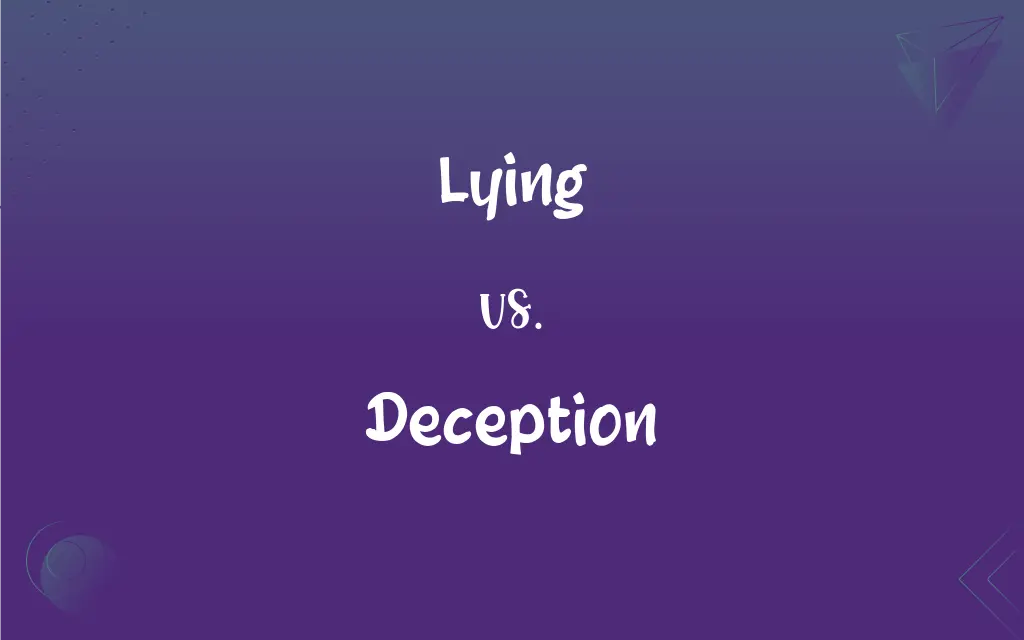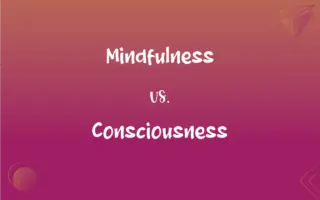Lying vs. Deception: What's the Difference?
Edited by Aimie Carlson || By Janet White || Published on December 1, 2023
Lying is the act of speaking falsehoods, while deception involves misleading others through any means, not just words.

Key Differences
Lying is the act of making a false statement with the intent to deceive. Deception, on the other hand, is a broader term that includes any act, statement, or practice intended to mislead someone. While all lying is deception, not all deception involves lying.
Lying specifically involves the use of false words or statements. Deception can include lying but can also encompass non-verbal cues, actions, omissions, or any other means of creating a false impression or misleading someone.
Both lying and deception involve the intent to mislead or create a false belief in another person. However, deception can be more complex, involving a series of actions or manipulations, while lying is generally a singular act of speaking untruthfully.
Ethically, lying is often considered wrong because it directly involves making a false statement. Deception, while also ethically questionable, can sometimes be seen in a more nuanced light, depending on its form and context.
In legal contexts, lying under oath is a crime known as perjury. Deception, depending on its form and intent, can lead to charges like fraud or false representation, highlighting its broader scope compared to lying.
ADVERTISEMENT
Comparison Chart
Definition
Making false statements intentionally
Misleading others by any means
Method
Involves spoken or written words
Includes actions, omissions, and non-verbal cues
Intent
To create a false belief through words
To mislead, which may involve complex strategies
Ethical View
Generally considered morally wrong
More nuanced, can be seen as manipulative
Legal Implications
Can be perjury if under oath
Can lead to charges of fraud or false representation
ADVERTISEMENT
Lying and Deception Definitions
Lying
Lying is the act of presenting falsehoods as truth.
He was caught lying to the authorities.
Deception
Deception is misleading someone by any means.
The scam involved elaborate deception.
Lying
Lying is intentionally making a false statement.
He was lying when he said he had never met her.
Deception
Deception includes creating false impressions.
His deception was revealed when the truth came out.
Lying
Lying involves speaking untruths to deceive.
Lying about her qualifications landed her in trouble.
Deception
Deception is the act of causing someone to believe something false.
Deception in advertising can lead to legal issues.
Lying
Lying means deliberately telling untruths.
She regretted lying about her age.
Deception
Deception means concealing the truth or misleading.
The magician’s skill lies in clever deception.
Lying
Lying is making statements that are not true.
Lying in court can have serious consequences.
Deception
Deception involves trickery or manipulation.
She used deception to hide her real intentions.
Lying
Present participle of lie1.
Deception
The use of deceit.
Lying
To be or place oneself at rest in a flat, horizontal, or recumbent position; recline
He lay under a tree to sleep.
FAQs
Is lying always verbal?
Yes, lying is specifically verbal or written falsehoods.
What is lying?
Lying is stating something false with the intention to deceive.
How is deception defined?
Deception is misleading someone through any means, not just words.
Is lying considered unethical?
Generally, lying is considered morally wrong.
Is deception always harmful?
Often, but sometimes it can be benign, like in certain forms of entertainment.
Can deception be non-verbal?
Yes, deception includes non-verbal cues and actions.
How do people usually detect lying?
Through inconsistencies in statements or body language.
Can deception occur without lying?
Yes, through misleading actions, omissions, or implications.
Are there legal consequences for lying?
Yes, particularly in legal settings like perjury.
How does society view deception?
Generally negatively, but it can be context-dependent.
What are the legal implications of deception?
Deception can lead to charges like fraud or false representation.
Is all lying considered deception?
Yes, lying is a form of deception.
Is lying always intentional?
Lying involves the intentional creation of a false belief.
Can deception be accidental?
Typically, deception is intentional but can be construed as accidental in certain contexts.
Are there psychological effects of lying?
Yes, lying can lead to stress, guilt, and trust issues.
Can lying ever be justified?
In some ethical views, lying can be justified in certain situations.
Can lying and deception be detected technologically?
Lie detectors aim to detect lying, but they are not always reliable.
Can deception be part of professional tactics?
Yes, in fields like espionage, law enforcement, or magic.
How does culture influence views on lying and deception?
Cultural norms and values significantly influence how lying and deception are perceived.
What role does intent play in lying and deception?
Intent is key in both, determining the purpose and morality of the acts.
About Author
Written by
Janet WhiteJanet White has been an esteemed writer and blogger for Difference Wiki. Holding a Master's degree in Science and Medical Journalism from the prestigious Boston University, she has consistently demonstrated her expertise and passion for her field. When she's not immersed in her work, Janet relishes her time exercising, delving into a good book, and cherishing moments with friends and family.
Edited by
Aimie CarlsonAimie Carlson, holding a master's degree in English literature, is a fervent English language enthusiast. She lends her writing talents to Difference Wiki, a prominent website that specializes in comparisons, offering readers insightful analyses that both captivate and inform.






































































